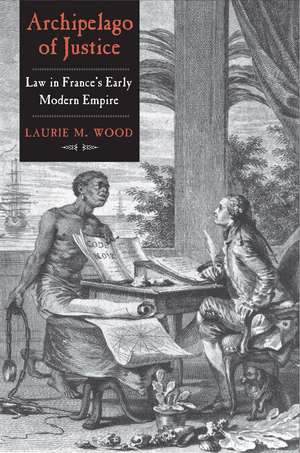Archipelago of Justice: Law in France’s Early Modern Empire
Autor Laurie M. Wooden Limba Engleză Hardback – 21 apr 2020
An examination of France’s Atlantic and Indian Ocean empires through the stories of the little-known people who built it
This book is a groundbreaking evaluation of the interwoven trajectories of the people, such as itinerant ship-workers and colonial magistrates, who built France’s first empire between 1680 and 1780 in the Atlantic and Indian Oceans. These imperial subjects sought political and legal influence via law courts, with strategies that reflected local and regional priorities, particularly regarding slavery, war, and trade. Through court records and legal documents, Wood reveals how courts became liaisons between France and new colonial possessions.
This book is a groundbreaking evaluation of the interwoven trajectories of the people, such as itinerant ship-workers and colonial magistrates, who built France’s first empire between 1680 and 1780 in the Atlantic and Indian Oceans. These imperial subjects sought political and legal influence via law courts, with strategies that reflected local and regional priorities, particularly regarding slavery, war, and trade. Through court records and legal documents, Wood reveals how courts became liaisons between France and new colonial possessions.
Preț: 338.96 lei
Preț vechi: 425.72 lei
-20% Nou
Puncte Express: 508
Preț estimativ în valută:
64.87€ • 67.55$ • 54.82£
64.87€ • 67.55$ • 54.82£
Carte indisponibilă temporar
Doresc să fiu notificat când acest titlu va fi disponibil:
Se trimite...
Preluare comenzi: 021 569.72.76
Specificații
ISBN-13: 9780300244007
ISBN-10: 0300244002
Pagini: 288
Ilustrații: 14 b-w illus.
Dimensiuni: 156 x 235 x 25 mm
Greutate: 0.57 kg
Editura: Yale University Press
Colecția Yale University Press
ISBN-10: 0300244002
Pagini: 288
Ilustrații: 14 b-w illus.
Dimensiuni: 156 x 235 x 25 mm
Greutate: 0.57 kg
Editura: Yale University Press
Colecția Yale University Press
Recenzii
“A richly researched and highly original work . . . that will be of lasting value as we recast our understanding of early modern France as a colonial empire.”—Ian Coller, American Historical Review
Winner of the Mary Alice and Philip Boucher Book Prize from the French Colonial Historical Society
“Laurie Wood makes innovative and sophisticated use of hitherto ignored legal sources to reconstruct the complex socio-political relationships that shaped life in the eighteenth-century French Caribbean and Indian Ocean.”—Richard B. Allen, author of European Slave Trading in the Indian Ocean, 1500–1850
“Laurie Wood has written an innovative, original book that will be of great value to anyone interested in early modern France and its overseas empire. She shows, lucidly and on the basis of exhaustive research, how ordinary people throughout the empire, in vastly disparate territories, were able to make use of a remarkably uniform legal system, based in the so-called conseils supérieurs. In short, she shows convincingly how this legal system helped to knit the empire together.”—David Bell, Princeton University
“Archipelago of Justice combines local and transnational frames of reference to show how the magistrates and litigants of a far-flung network of courts at the outer limits of the monarchy’s sphere of authority helped tie France’s global empire together into a largely unified and cohesive whole.”—Michael Breen, Reed College
Winner of the Mary Alice and Philip Boucher Book Prize from the French Colonial Historical Society
“Laurie Wood makes innovative and sophisticated use of hitherto ignored legal sources to reconstruct the complex socio-political relationships that shaped life in the eighteenth-century French Caribbean and Indian Ocean.”—Richard B. Allen, author of European Slave Trading in the Indian Ocean, 1500–1850
“Laurie Wood has written an innovative, original book that will be of great value to anyone interested in early modern France and its overseas empire. She shows, lucidly and on the basis of exhaustive research, how ordinary people throughout the empire, in vastly disparate territories, were able to make use of a remarkably uniform legal system, based in the so-called conseils supérieurs. In short, she shows convincingly how this legal system helped to knit the empire together.”—David Bell, Princeton University
“Archipelago of Justice combines local and transnational frames of reference to show how the magistrates and litigants of a far-flung network of courts at the outer limits of the monarchy’s sphere of authority helped tie France’s global empire together into a largely unified and cohesive whole.”—Michael Breen, Reed College
Notă biografică
Laurie M. Wood is assistant professor of history at Florida State University, where she is affiliated with the Institute on Napoleon and the French Revolution.
